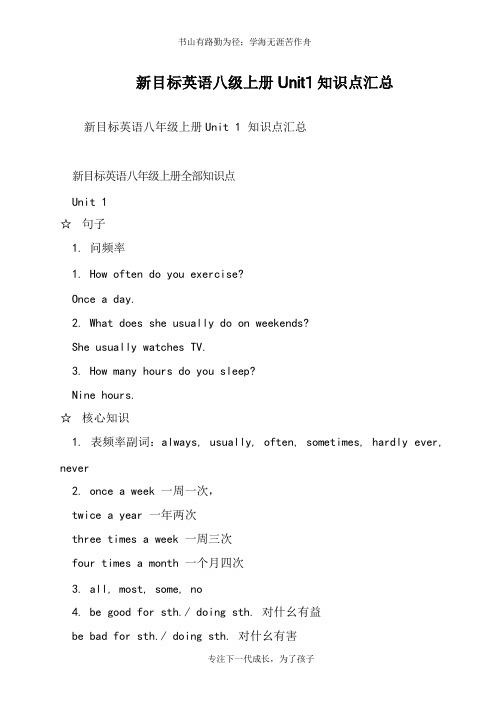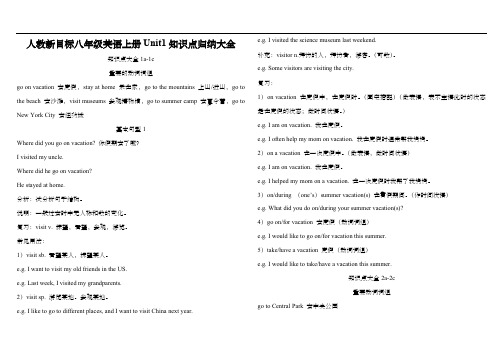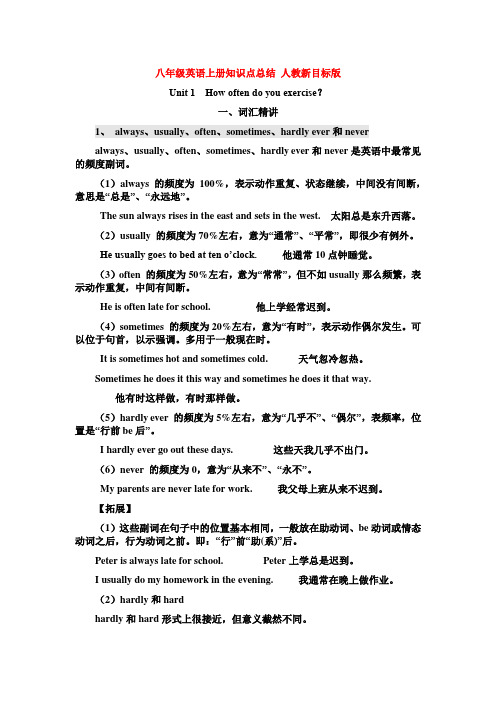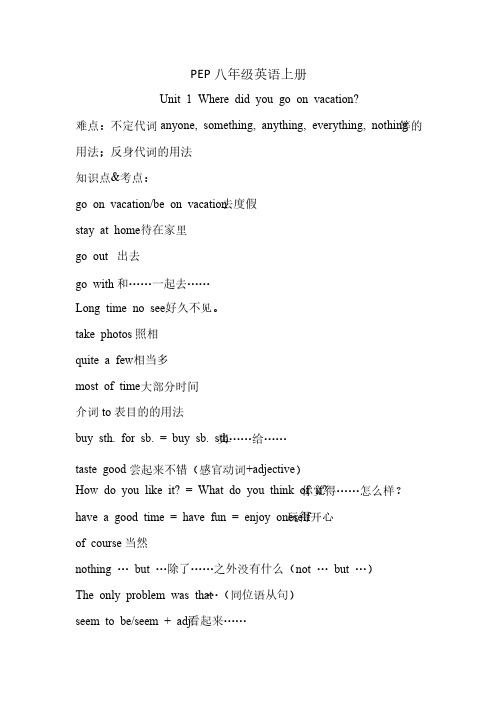新目标八年级上册Unit 1课本重点讲解与归纳
- 格式:docx
- 大小:24.96 KB
- 文档页数:9


人教新目标八年级英语上册Unit1知识点归纳大全知识点大全1a-1c重要的动词词组go on vacation 去度假,stay at home 呆在家,go to the mountains 上山/进山,go to the beach 去沙滩,visit museums 参观博物馆,go to summer camp 去夏令营,go to New York City 去纽约城基本句型1Where did you go on vacation? 你假期去了哪?I visited my uncle.Where did he go on vacation?He stayed at home.分析:试分析句子结构。
说明:一般过去时中无人称和数的变化。
复习:visit v. 探望,看望,参观,游览。
常见用法:1)visit sb. 看望某人,探望某人。
e.g. I want to visit my old friends in the US.e.g. Last week, I visited my grandparents.2)visit sp. 游览某地。
参观某地。
e.g. I like to go to different places, and I want to visit China next year. e.g. I visited the science museum last weekend.补充:visitor n.拜访的人,拜访者,游客。
(可数)。
e.g. Some visitors are visiting the city.复习:1)on vacation 在度假中,在度假时。
(固定搭配)(做表语,表示主语此时的状态是在度假的状态;做时间状语。
)e.g. I am on vacation. 我在度假。
e.g. I often help my mom on vacation. 我在度假时通常帮我妈妈。

八年级英语上册知识点总结人教新目标版Unit 1 How often do you exercise?一、词汇精讲1、always、usually、often、sometimes、hardly ever和neveralways、usually、often、sometimes、hardly ever和never是英语中最常见的频度副词。
(1)always 的频度为100%,表示动作重复、状态继续,中间没有间断,意思是“总是”、“永远地”。
The sun always rises in the east and sets in the west. 太阳总是东升西落。
(2)usually 的频度为70%左右,意为“通常”、“平常”,即很少有例外。
He usually goes to bed at ten o’clock. 他通常10点钟睡觉。
(3)often 的频度为50%左右,意为“常常”,但不如usually那么频繁,表示动作重复,中间有间断。
He is often late for school. 他上学经常迟到。
(4)sometimes 的频度为20%左右,意为“有时”,表示动作偶尔发生。
可以位于句首,以示强调。
多用于一般现在时。
It is sometimes hot and sometimes cold. 天气忽冷忽热。
Sometimes he does it this way and sometimes he does it that way.他有时这样做,有时那样做。
(5)hardly ever 的频度为5%左右,意为“几乎不”、“偶尔”,表频率,位置是“行前be后”。
I hardly ever go out these days. 这些天我几乎不出门。
(6)never 的频度为0,意为“从来不”、“永不”。
My parents are never late for work. 我父母上班从来不迟到。

人教新目标英语八年级上册Unit 1 Where did you go on vacation?1.go on vacation 去度假= go for a vacation/holiday→(be) on/for a vacation 度假= have/take a vacation2.New York City = the city of New York3.visit sb./sp.(v.)= pay/have a visit to sb./sp.(n.) 参观/拜访某处/某人4.go to summer camp5.go with sb.→ go out with sb.6.Central Park 中心公园→ center: the center of …7.合成不定代词:⑴构成:①指人:someone/somebody “某人”(肯定句);anyone/anybody “某人(疑问句,否定句代替someone/somebody)”;“任何人(肯定句)”;everyone/everybody “每个人”;no one/nobody “没有人”;②指物:something “某物(肯定句)”;anything “某物(疑问句或否定句代替something)”;“任何东西(肯定句)”; everything “每件东西”;nothing “没有东西”;⑵用法:①合成不定代词作主语看成单数第三人称形式,谓语动词用单数形式;②形容词,动词不定式修饰合成不定代词,位于其合;⑶注意:①not … anything = nothing; not … anybody = nobody;②nobody/no one/nothing与none的区别:㈠nobody/no one “(只能指人)没有一个(人)”;不能与of连用;回答who问句;㈡nothing “(只能指物)没有一件(物品)”;不能与of连用;回答what问句;㈢none “(指人或物)没有一个(人)或(物品)”;可以和of连用;回答how many问句;⑷不定副词:somewhere “某处”(肯定句)anywhere “某处”(肯定句代替somewhere)/“任何地方”(肯定或否定句)everywhere “每个地方,到处”nowhere “没有地方(否定词)”※形容词修饰不定副词,也位于不定副词的后边。

人教新目标英语八年级上册Unit1 Where did you go on vacation?单元知识要点一、语法:一般过去时1. 概念一般过去时表示过去某个时间里发生的动作或状态;过去习惯性、经常性的动作、行为。
常与过去的时间状语连用。
例如:yesterday,the day before yesterday,last week,last month,in 2008,two days ago,this morning/afternoon/evening,when引导的状语从句(动词过去时),just now,in the old days,at that time,at that moment等。
2.谓语构成:动词的过去式动词过去式的变化:1)规则变化:2)不规则变化:3)have---had are---were is/am---was do---did二、一般过去时结构(1)有Be动词的过去时结构:肯定句:主语+was/were+其他Jim was angry last night..否定句:主语+was/were+not+其他Jim wasn’t angry last night..一般疑问句:was/were+主语+其他?Was Jim angry last night? 否定回答:No, 主语+ wasn’t/weren’t.No, he wasn’t.特殊疑问句:特殊疑问词+一般疑问句结构?How was Jim last night?(2)句中没有be动词的一般过去时的句子肯定:主语+动词过去式+其他eg. Jim went home yesterday.否定:主语+ didn’t +动词原形+其他Jim didn’t go home yesterday.一般疑问句:Did+主语+动词原形+其他Did Jim go home yesterday?肯定回答:Yes, 主语+ did. Yes, he did.否定回答:No, 主语+ didn’t. No, he didn’t.特殊疑问句:疑问词+did+主语+动词原形+其他?What did Jim do yesterday? Who went to home yesterday?复合不定代词和复合不定副词英语中,像something等这样的词叫复合不定代词;像somewhere这样的词叫复合不定副词。

PEP八年级英语上册八年级英语上册Unit 1 Where did you go on vacation? 难点:不定代词anyone, something, anything, everything, nothing等的用法;反身代词的用法用法;反身代词的用法知识点&考点:考点:go on vacation/be on vacation 去度假去度假stay at home 待在家里待在家里待在家里go out 出去出去go with 和……一起去……和……一起去……Long time no see. 好久不见。
好久不见。
take photos 照相照相quite a few 相当多相当多相当多most of time 大部分时间大部分时间大部分时间表目的的用法介词to表目的的用法buy sth. for sb. = buy sb. sth. 买……给……买……给……taste good 尝起来不错(感官动词+adjective)How do you like it? = What do you think of it? 你觉得……怎么样?你觉得……怎么样?have a good time = have fun = enjoy oneself玩得开心玩得开心of course 当然当然nothing …but …除了……之外没有什么(not …but …)…)The only problem was that …(同位语从句)…(同位语从句)seem to be/seem + adj. 看起来……看起来……keep a diary 记日记记日记记日记 + at + 小地点小地点小地点arrive + in + 大地点大地点大地点 decide to do 决定做某事决定做某事决定做某事 try doing sth. 尝试做某事尝试做某事尝试做某事 try to do sth. 尽力做某事尽力做某事feel like 感觉到感觉到 feel like + n./ v-ing 想要……想要……ride … to …骑……到………骑……到……许多的:a lot of + 可数名词可数名词 lots of + 可数可数or 不可数名词不可数名词 I wonder that …我想知道………我想知道………我想知道…… in the past 在过去在过去在过去 enjoy doing sth. 享受做某事享受做某事享受做某事 walk around 到处逛逛到处逛逛感叹句:What + 冠词冠词 + adj. + n. + (it is) = How + adj. + 冠词冠词 + n. + (it is) start start doing doing doing sth. sth. 开始做某事开始做某事 stop stop doing doing doing sth. sth. 停止做某事停止做某事 finish finish doing doing sth. 结束做某事结束做某事because & so (不可同用)(不可同用)(不可同用) wait for …等待………等待……because of + n. a little/ a few 一些(两者的区别,以及与little/few 的区别)的区别) enough + n. / adj. + enough as + adj./adv. + as 和……一样……和……一样……one bowl of …一碗………一碗……along the way 沿着这条路沿着这条路沿着这条路 时间段+ later = after + 时间段……之后时间段……之后other, others, the other, the others, another on trip 在旅途中在旅途中find out 找到,找出找到,找出 / find 寻找寻找 / look for 寻找寻找寻找 so + adj. + that + 从句如此……以致……从句如此……以致……tell sb. (not) to do sth. 告诉某人(不要)做某事告诉某人(不要)做某事keep doing sth. / go on doing sth. 继续做某事继续做某事keep sth. + adj. 使……保持……状态使……保持……状态up and down (人)来来往往;(人)来来往往;(物)上上下下(物)上上下下in excitement = excitedly 兴奋地兴奋地come up / come out / come on / come in forget to do sth. 忘记做某事忘记做某事 forget doing sth. 忘记做过某事忘记做过某事忘记做过某事 like / dislike + n. / v-ing 喜欢/不喜欢某物/做某事做某事something + adj. ……的事情……的事情……的事情 Why not + v. = Why don ’t you + v. 为什么不……呢?为什么不……呢?Unit 2 How often do you exercise? 重点:1. How often 句型的运用;2. 2. 六个频度副词六个频度副词never, hardly ever, sometimes, sometimes, often, often, often, usually, usually, usually, always always 的差异、理解及使用;3. 频率数词once, twice 等的认识和运用;4. 一般现在时不同人称谓语形式的变化及一般疑问句的问答。
Unit 1Where did you go on vacation?知识点讲解一、语法:不定代词(一)、由some, any, no, every与thing, one, body 构成的不定代词称为复合不定代词。
someone / somebody 某人something 某事;某物anyone / anybody 任何人anything 任何事物no one / nobody 无人;没有人everyone / eveybody 每人everything 每一件事物;一切nothing 没有什么1.复合不定代词作主语时,都坐单数看待,谓语动词用第三称单数。
No one knows the answer. 没有人知道这个答案。
There was nothing much to do in the evening. 在晚上无事可做。
Everyone ______ ( have ) a computer in my family. 在我家每人都有一台电脑。
Everything___________ ( begin) to grow in spring. 在春天,万物开始生长。
2.形容词、动词不定式等作定语修饰复合不定代词时,要放在不定代词之后。
There is nothing interesting in the newspaper.报纸上没有什么有趣的事情。
Do you want anything to drink?你想喝点什么吗?I would like something to eat. 我想要些吃的?3. 一般情况下,含有some的复合不定代词someone / somebody, something常用于肯定句,含有any的复合不定代词anyone / anybody, anything常用于否定句、疑问句中代替someone / somebody, anytning表示“ 某人”,“某物”。
人教版新目标八年级英语上册各单元重点单词和短语梳理归纳Unit 1 Where did you go on n?In this unit。
we learn some XXX.1.Phrasesgo on n: XXXstay at home: not go XXXgo to the mountains: XXXgo to the beach: XXXvisit museums: go to museums for sightseeinggo to summer camp: XXXquite a few: a considerable numberstudy for: learn for a specific purposego out: leave the house for activitiesmost of the time: the majority of the timetaste good: have a good flavorhave a good time: enjoy oneselfof course: certainlyfeel like: have the feeling ofgo shopping: visit stores for shoppingin the past: before nowwalk around: stroll in an areabecause of: due toXXX: a serving ofthe next day: the following dayXXX: have tea as a XXXfind out: discovergo on: continuetake photos: use a camera to capture images XXXup and down: moving in different ns come up: appear or XXX2.Sentence Structuresbuy sth。
新目标八年级上册英语Units1-5单元知识点归纳Unit1 Where did you go on vacation?go on vacation去度假 stay at home待在家里 go to the mountains去爬山go to the beach去海滩 visit museums 参观博物馆 go to summer camp去参观夏令营quite a few相当多 study for为……而学习 go out出去 most of the time大部分时间taste good尝起来很好吃 have a good time玩得高兴 of course当然 feel like给……的感觉;感受到go shopping去购物 in the past在过去 walk around四处走走 because of因为one bowl of…一碗…… the next day第二天 drink tea喝茶 find out找出;查明 go on继续take photos照相 something important重要的事 up and down上上下下 come up出来buy sth. for sb. / buy sb. sth.为某人买某物taste + adj. 尝起来…… look+adj. 看起来……nothing…but+动词原形除了……之外什么都没有seem+(to be)+ adj. 看起来……arrive in+大地点 / arrive at+小地点到达某地decide to do sth.决定去做某事try doing sth.尝试做某事 / try to do sth.尽力去做某事forget doing sth.忘记做过某事/ forget to do sth.忘记做某事enjoy doing sth.喜欢做某事 want to do sth.想去做某事 start doing sth.开始做某事stop doing sth. 停止做某事 dislike doing sth. 不喜欢做某事 keep doing sth.继续做某事Why not do. sth.?为什么不做……呢?so+adj.+that+从句如此……以至于……tell sb. (not) to do sth. 告诉某人(不要)做某事Unit2 How often do you exercise?help with housework帮助做家务 on weekends在周末 how often多久一次 hardly ever几乎从不once a week每周一次 twice a month每月两次 every day每天 be free有空go to the movies去看电影 use the Internet用互联网 swing dance摇摆舞 play tennis打网球stay up late熬夜;睡得很晚 at least至少 have dance and piano lessons上舞蹈课和钢琴课go to bed early早点睡觉 play sports进行体育活动 be good for对……有好处 go camping去野营not…at all一点儿也不…… in one’s free time在某人的业余时间 the most popular最受欢迎的such as比如;诸如 old habits die hard积习难改 go to the dentist去看牙医morn than多于;超过 less than少于help sb. with sth.帮助某人做某事 How about…? ......怎么样?/ ……好不好?want sb. to do sth.想让某人做某事 How many+可数名词复数+一般疑问句?……有多少……?主语+find+that从句. ……发现…… spend time with sb.和某人一起度过时光It’s+ adj.+ to do sth. 做某事的……的。
人教新目标英语八年级上册Unit1 Where did you go on vacation?常用短语1.go on vacation去度假2.stay at home待在家里3.go to the mountains去爬山4.go to the beach去沙滩5.visit museums参观博物馆6.go to summer camp去参加夏令营7.quite a few相当多,不少 8.study for…为…而学习 9.go out出去,外出10.most of the time大部分时间 11.taste good尝起来好吃 12.of course当然,自然13.feel like给…的感觉,感受到 14.go shopping=do some shopping去购物 15.in the past在过去16.walk around四处走走 17.over an hour 一个多小时 18.too many people 太多的人19.get to the top到达顶部20.because of the bad weather因为坏天气21.something important重要的事22.another two hours另外两个小时23.the top of the hill山顶 24. one bowl of fish 一碗鱼肉25.go to the countryside 去乡下 26.in the shopping center 在购物中心 27.keep going 一直走28.have a fun(good)time玩得开心29.after three hours三个小时以后30.twenty minutes later20分钟后31.the next day第二天 32.find out找出,查明 33.take photos照相34.keep a diary记日记语法集萃1. seem +adj.(形容词)= seem to be +adj. (形容词)看起来… ; seem to do sth. 似乎要做某事2. decide to do sth. 决定做某事;decide not to do sth.决定不做某事3. try 的用法: 1) have a try 试一试 2) try to do sth. 尽力/ 设法去做某事3) try doing sth. 尝试着做某事4) try one’s best to do sth. 尽某人最大努力做某事。
新目标八年级上册Unit 1课本重点讲解与归纳1.Long time no see.好久不见。
2.go somewhere interesting去一些有趣的地方meet someone interesting遇见一些有趣的人do something special做一些特别的事情3.复合不定代词someone=somebody(anyone,noone,everyone),something(anything, nothing, everything)1). I can see something in the picture.(否) I______ see _________ in the picture. (can’tanything / can nothing)2)._________ is here.大家都来了。
(Everyone)3). I’d like to e at something delicious. (后跟形容词)I want to eat something I like.(后跟定语从句)There is something else to eat.(后跟else / todo)4.take quite a few photos拍了相当多的照片1). It’s a very interesting book. = It’s quite aninteresting book.2). I’d like __ bananas and pears. O h, I only need __ orange juice.A. some, a fewB. a few,a littleC. a little, a fewD. a little, few5.Not really (= Nothing much). I just stayed athome most of the timetoreadand relax.真没什么。
我只是大部分时间呆在家里读书和休息。
1). most of大部分的,many / much of许多的,some of ...中的一些one of ...之一2).动词后面再跟动词,一般用to do表目的6.Huangguoshu Waterfall is wonderful!黄果树瀑布真壮观!(wonder - wonderful)7. How did you like it?你认为它怎么样啊?= Howdidyou______it?=Whatdid you___ ___ it?(feel about, think of / about)8.Of course!当然,自然。
9.myself , yourself, himself, herself, itself, ourselves,yourselves, themselves反身代词,“...自己”10.I didn’t really see anything I liked.我真的没看到我喜欢的东西。
11.some hens and baby pigs一些母鸡和小猪12.The only problem was that there was nothing much to do in the evening but read.唯一的问题是在晚上除了读书,无事可做。
1). problem需要解决的问题- question需要回答的问题2). was that +表语从句3). nothing ...but (do) = only除了...没有...13.Still no one (= nobody) seemed (to be) bored. =Stillitseemedthatnoonewas bored.依然似乎没有人感到无聊。
seem +形容词= seem to be +形容词,seem to do sth. , It seems / seemed that+陈述句14.Bye for now!就此止笔!到此为止!15.keep a diary记日记keep one’s hair(sth.) short (形容词)留短发, keep warm (形容词)取暖keepdoing sth.坚持做某事16.all (“全体,全部”,强调整体)- none (“没人/物”,全部否定)17.every (“每一个”,强调整体)- each (“每一个”,强调个体)18.both (“两个都”)- either (“两者中的任何一个”)-ne ither (“两者都不”)19.other / others (“其他的”)- another (“另一个”)one ... another ... the other ... some ... others ...20.some (“一些”,用于肯定句)any (“一些”,用于否定和疑问句;“任何”,用于肯定句)21.many / much (“很多”) - most (“大部分”)22.What activities do you find enjoyable?你发现什么活动令人赏心悦目啊?1).act行动,表演–actor/actress男女演员–action行动–active积极的,活跃的–activity活动2). find sth. +形容词“发现某事物...”3). enjoy doing sth.喜欢做某事- enjoyable令人愉快的23.arrive in / at = get to = reach到达24.decide to do = make a decision to do决定做某事25.try paragliding尝试滑翔伞运动try doing sth.尝试做某事try (one’s best) to do sth.竭尽全力做某事try on试穿have a try试一试26.I felt like I was a bird.我感觉像一只鸟。
Sound like you had a good time (= enjoyed yourselves) at the park.feel like doing = would like to do = want to do27.ride (rode) bicycles (= bikes) to Georgetown = go to Georgetown by bicycle / bike骑车去乔治城28.Many of the old buildings are still there.许多古老的建筑物依旧在那儿。
29.the houses of the Chinese traders from 100 years ago百年前中国商人的房屋building楼房- house平房30.I wonder what life was like here in the past. = I want to know how the life washere in the past.我想知道过去的生活是什么样子的。
31.What a difference a day makes!一天的变化竟然如此之大!make a difference发生变化,产生影响他们玩儿的真开心啊!_____ a good time they____!(What, had)好漂亮的花啊!_____ beautiful flowers they are!(What)他们好开心啊!____ happy they ____! (How, are)32.walk up to the top走上山顶up向上- down向下,沿着33.Wewaitedoveranhourforthetrainbecausethereweretoomanypeople(=because of too many people).因为人太多了,我们等了一个多小时的火车。
wait for等待,等候over = more than超过,多于because连词,后跟句子- because of介词短语,后跟名词或代词toomany/toomuch+名词,“太多的...”-muchtoo+形容词/副词,“过于...”34.When we got to the top, it was raining really hard.当我们到达山顶的时候,雨真的下大了。
1).when引导时间状语从句“当...的时候”+过去时(got),主句用过去进行时was / were doing2).rain a little下小雨- rain hard / heavily下大雨35.We didn’t have an umbrella so we were wet andcold.=Wewerewetandcold _______ we ____ no umbrella.我们没带伞,所以又湿又冷。
(because, had)36.And because of the bad weather, we couldn’tseeanythingbelow.=Wecouldsee ________ below_______ the weather ___ bad.由于天气恶劣,我们看不见下面的事物。
(nothing, because, was)below水平下方- above水平上方37.My father didn’t bring enough money. = My father didn’t ____ enough money____ ___. = Myfather’s money ______ _______.我爸爸没带够钱。
(take, with him, wasn’t enough)Mary到了上学的年纪了。
Mary is old enough togo to school.Jim年纪太小,不能上学。
Jim isn’t old enough togotoschool.=Jimistooyoung to go to school.38.hungry饿了–full饱了* thirsty渴了39.The next day was not as good.第二天就没那么好了。
40.And that’s not all.那还不是全部。
41.about one hour later = after one hour一个小时之后42.walk for another two hours (= two more hours) .43.又走了两个小时44.look wonderful from the top of the hill从山顶看美妙绝伦45.Someone found out we weren’t anywhere near the top.有人发现我们没有在山顶附近。